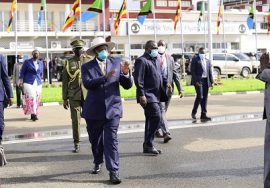
Highly Exclusive: U.N. Agency writes to Uganda Over Meteorological Authority
By Executive Editor
The World Meteorological Authority (WMO) has written to Uganda over the status of the Uganda Meteorological Authority (UNMA). The World Meteorological Organization is a specialized agency of the United Nations responsible for promoting international cooperation on atmospheric science, climatology, hydrology and geophysics.
Currently, there is an on going debate on whether or not to merge several government agencies in a bid to among others achieve efficiency.
UNMA was created by the UNMA Act of 2012 and has been operational since 2015.
Should the government stick with the merger idea, UNMA will have to return to the Ministry of Water and Environment as a department where it failed years ago because it could not fit in the core mandates of seven Ministries due to its specialized nature.
Now, the World Meteorological Organization has written to Uganda highlighting its recommendation of maintaining UNMA as an autonomous entity.
“In this regard, I have the honour to inform you that it is now a global trend for National Meteorological and Hydrological Services (NMHSs) to transform into Semi-Autonomous Government Agencies and Authorities (SAGA) for more efficient and effective delivery of services required by governments, the general public and other stakeholders. Further, it is worth noting that the mission and purpose of the NMHSs including UNMA are defined in Part II Article 2 of the Convention of the World Meteorological Organization (WMO), which came into force in 1947 and outlines services in support of relevant national needs…” WMO Secretary General Prof. Petteri Taalas wrote to the Minister of Water and Environment, Sam Cheptoris, on September 30, 2021.
Like other NMHSs, Prof. Petteri said UNMA issues early warning services for disaster risk reduction (DRR) to reduce loss of lives and protection of property.
“For socio-economic development and environment protection, UNMA like other NMHSs, provides tailored services to key sectors of the economy including agriculture and food security, water, health, disaster management, energy, transport, forestry eco-systems and tourism, among others. This demonstrates that UNMA like other NMHSs of WMO Members contributes to nearly all the 17 UN Sustainable Development Goals (SDGs), where Goal 13 on Climate Change is solely the prerogative of the NMHS,” wrote Prof. Petteri.
In terms of standards in service delivery, a good example is given to Annex 3 to the Chicago Convention (1945) for International Civil Aviation (ICAO) on Meteorological Services for International Air Navigation which stipulates ISO certification standards as a Quality Management System (QMS) or framework for the provision of services issued by UNMA.
To this, Prof. Patteri said: The Republic of Uganda is a party to the Chicago Convention on ICAO – and better services will continue to be provided for civil aviation over the Uganda airspace on a cost-recovery basis as demanded by the aviation section, if UNMA retains the SAGA status.
According to Prof. Petteri, following lessons learned from the Covid-19, UNMA would provide better required information and data for countries to develop the intended Nationally Determined Contributions (NDCs) to the United Nations Framework Convention to Climate Change (UNFCCC) for the Paris Agreement (2015) on Climate Change.
“This information is essential to limit rising surface temperatures at the global level average of 1.5 degree celcius and for building resilience of countries through adaptation and mitigation measures in order to cope with the associated adverse impacts,” said Prof. Petteri.
In conclusion, Prof. petteri said: Since it is now a regional and global trend for NMHSs to transform into SAGAs for provision of more efficient and effective service delivery for DRR and socio-economic development and environmental protection as well as building resilience to adverse impacts of climate change, it is my humble recommendation to retain UNMA as a semi-autonomous entity within the Government of the Republic of Uganda. We will be willing in the WMO to share best practices from other successful NMHSs in the region and elsewhere, to encourage the growth and sustainability of UNMA.






